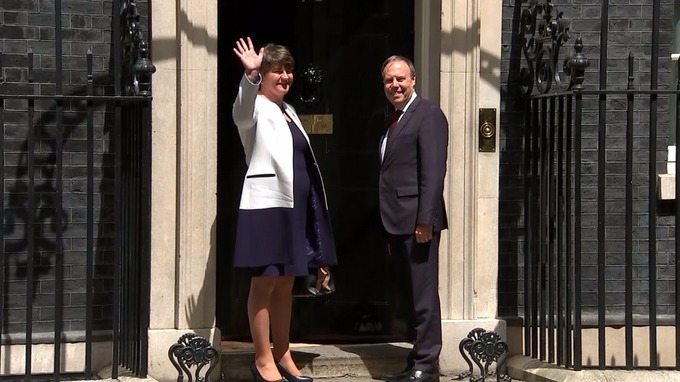
Deal with the devil: Why we’re banking on Theresa May’s DUP talks crashing and burning
Katie Goh
21 Jun 2017
Theresa May has failed to lock down negotiations with the DUP, resulting in a raft of her more divisive social policies being dropped from her speech at today’s State Opening of Parliament. May has failed to secure a majority, or to form a government since the snap election was held on 8 June.
As the general election results were finalised, a spotlight was shone on Northern Ireland. Usually pushed to the margins of British politics, the small country was dragged onto centre stage as Theresa May announced that the Conservative Party would make a “deal” with the Northern Irish Democratic Unionist Party (DUP) to form a minority government. Cue plenty of frantic Google searches and the DUP’s website crashing.
Unless you’re from Northern Ireland or have studied politics, it’s unlikely you’ll know much about the DUP. The DUP is Northern Ireland’s largest party, founded in 1971 by the Protestant zealot Ian Paisley. Unlike in England, Scotland, and Wales, the Conservatives and Labour are not prominent players in Northern Irish politics. Instead the DUP and Sinn Féin are the country’s two major oppositional parties. Born out of The Troubles, the DUP are political and religious fundamentalists, and hard-line unionists who oppose Irish unification. On the other side is Sinn Féin, the Irish republican party that opposes British rule in Northern Ireland and who abstain from taking their Westminster seats. Both parties are historically associated with paramilitary violence: Sinn Féin with the Irish Republican Army (IRA) and the DUP with the Ulster Defence League (UDA).
So why are people so worried about the Conservative’s negotiations with the DUP? Most obvious is the party’s connection to paramilitary groups. Just weeks ago, a man was shot dead in a supermarket car park and the incident has since been connected to the UDA. Arlene Foster, leader of the DUP and First Minister of Northern Ireland, was reported to have met with the UDA’s leader during the election campaign and has repeatedly defended her party’s association with the paramilitary group. At the same time as the shooting, right-wing media and politicians were leading a smear campaign against Jeremy Corbyn and his “association” with the IRA. Outside of Northern Ireland, the paramilitary shooting received little coverage and was generally ignored by British politicians. There is stunning hypocrisy in the Conservatives using the DUP, a party intrinsically connected to violent sectarianism, to form a government while just last week they derailed Corbyn for being a Fenian sympathiser.
However, most concerning about the negotiations is the DUP’s horrific track record with human rights. Northern Ireland is the only country in the UK where gay marriage is illegal and the DUP have been responsible for blocking attempts at legalisation. In 2015, same-sex marriage was approved but never passed because the DUP triggered a “petition of concern” meaning that a sufficient number of both unionist and nationalist politicians had to support the bill. While enough nationalists supported equal marriage, only four unionists approved the bill. A fundamentalist Christian party, the DUP have been involved with numerous accounts of open homophobia, having called LGBTQ people an “abomination” and “disgusting”. Just yesterday the Scottish government published a letter sent by Arlene Foster to minister Marco Biagi asking for same-sex marriage to be curtailed for Northern Irish couples in Scotland.
Northern Ireland also has an abhorrent stance on reproductive rights, and is the only part of the UK where abortion remains illegal. Women who have sought abortions are punished by law, even in cases of rape, incest, or foetal abnormalities. Currently, there are numerous women awaiting trial in Northern Ireland for terminating pregnancies in the privacy of their own homes, who have been reported to authorities by flatmates or families. The DUP have led the charge in retaining the ban, staunchly believing that abortion is a sin against God. In November 2016, Belfast’s High Court ruled that Northern Ireland’s abortion ban breached human rights laws as did the UN’s Human Rights Committee in June 2016. People in England, Scotland and Wales may be learning about the horrors of the DUP for the first time this month, but Northern Ireland’s criminalisation of abortion has existed for decades without any retribution or involvement from Britain. While Labour’s manifesto mentioned that they would “work with the Assembly” to extend abortion rights to Northern Ireland, the Conservative and DUP manifestoes had no mention of abortion or gay marriage in Northern Ireland.
For Northern Irish women, LGBTQ people, and people of colour, the DUP have continually proven to be an oppressive and hate-fuelled force with complete disregard for human rights. The DUP advocated for leaving the EU and support a “hard Brexit”, an action that threatens both the Northern Irish peace process and human rights, as the country will operate without EU legislation, such as the Istanbul Convention. The DUP also has a worrying stance on global warming and have previously appointed a climate denier as environmental minister and advocated for “creationism” to be taught in schools.
Before the general election, the DUP were in trouble. In a poll conducted by the Belfast Telegraph, Arlene Foster was voted “least trustworthy” party leader. Northern Ireland’s snap assembly election in March resulted in a surge of nationalism which led to the DUP losing ten seats. However, the Conservative’s deal has provided the DUP with a resurrection. The DUP has been given a nationwide platform for their stances – on paramilitary associations, LGBTQ rights, abortion rights, and climate change – and validation by the Prime Minister and the Conservatives. That the DUP, one of the UK’s most regressive, theocratic, and dangerous parties, will prop up Westminster’s largest party is a terrifying prospect that throws a grenade into Brexit negotiations, Northern Irish peace, and fundamental human rights.

Britain’s policing was built on racism. Abolition is unavoidable

How Pakistan’s Khwaja Sira and transgender communities are fearing and fighting for their futures

Their anti-rape performance went viral globally. Now what?






